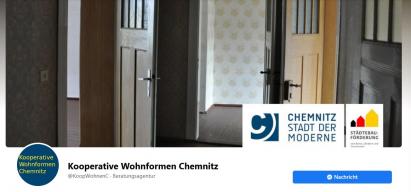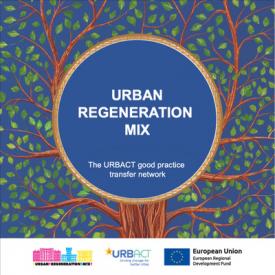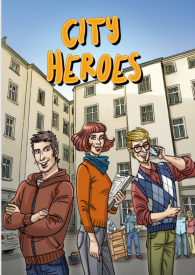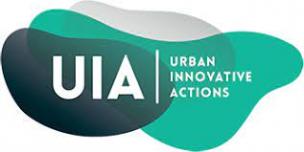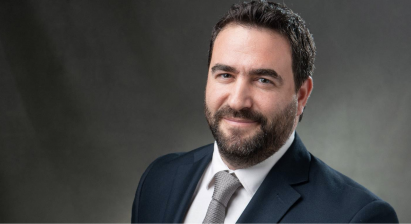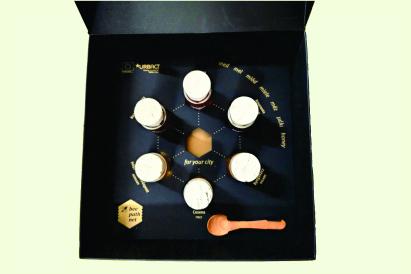-
-
-
-
-
-
AGRO CITY - MAC
ItalyPozzuoliAgro-Urban Landscape to combat poverty and redevelop the urban environment
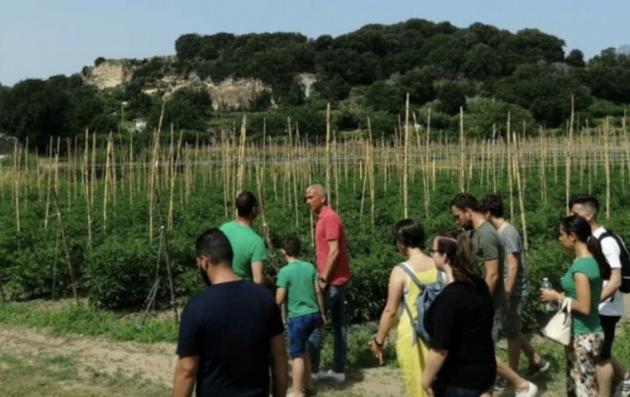 Comune di PozzuoliCopy linkFacebookXLinkedInEmail81 824
Comune di PozzuoliCopy linkFacebookXLinkedInEmail81 824Summary
MAC proposes a series of activities with the aim of redeveloping the urban environment and, at the same time, fighting poverty in the Monterusciello district in Pozzuoli, where the current problems of the social context are combined with a difficult urban environment, characterized by isolation, anonymity and decay of public spaces. The overall objective of the MAC project focuses on the residents' poor economic conditions such as low income and unemployment, the lack of business activities, large abandoned green areas and unused public buildings, as well as a lack of quality relationships and trust between citizens and the administration. Through a process of economic, entrepreneurial, and social development, MAC is creating a new Agro-Urban Landscape based on an interconnection of urban areas and agricultural land. About fifty hectares of Municipal owned open areas are transformed into farmland, developed with the innovative techniques of permaculture to spearhead an economic process and urban growth as a means to combat poverty. The project is based on 4 four pillars: the launch of agricultural activities based on the principles of permaculture and organic urban agriculture; the improvement of the urban environment; professional training; encouraging entrepreneurship and employment.
The innovative solution
Urban agriculture is going to offer job opportunities, training, and quality products, while the city will benefit from renewed common spaces and green areas. Along with architectural, urban, landscape and agricultural investments, professional training courses. The MAC project has put in action a strategy coordinated from a new Agro-Urban Center, which will increase the municipality role in the neighbourhood involving the residents in better identifying local issues and solutions. It has transformed thirty hectares of unused areas through the implementation of innovative agriculture while promoting work in the area and developing new skills. The project has also developed the local economy through the Laboratory of Ethical Production and Rural Marketing, trained new innovative business enterprises and supported new start-up companies which will be hosted within the Business Incubator Centre. It developed the Km0 local market through a network with other local producers, hence improving the current open-air week markets. Mac has also acted on the quality of the urban spaces such as architecture interventions and activated spaces within the existing and un-used public buildings for the laboratories and the Agro Urban Centre. Last but not least, it has provided areas for events, a bike path, walkways and seating areas, all to be set along the agriculture areas overlooking the greenery.
A collaborative and participative work
Through the construction of the AGRO URBAN CENTER (AUC) the MAC project installs on the territory, right in the central square of Monterusciello, a space of continuous communication between the municipality, the residents and the key local actors for the identification of local urban problems and the construction of solutions. Participation constitutes a foundation of the present and future actions of the MAC. The principle of local rooting is considered essential for defining co-design processes that lead to the realization of projects accepted by the local community and therefore sustainable. Together with the AUC, the MAC project developed the Consulta Urbana. This is a tool to better structure the process of sharing choices and to give a renewed centrality of the territorial requests within the decision-making processes.
The impact and results
Agriculture, and therefore Urban Agriculture, operated at a considerable scale and organized through professional work and means within an urban context, is an economic activity that can continue to be carried out even in periods where many productive activities must to be stopped, undeniably (e.g. the COVID 19), it becomes crucial for the well-being of the whole community: a key resilient economic activity. The contemporaneity of urban planning must look to a new green deal, in this sense, solutions based on nature, and in their integration with the training and production sectors, together with an innovative and shared conception of public spaces, as promoted within the MAC project, make a difference in the quality of life and in the development opportunities offered to citizens.
Why this Good Practices should be transferred to other cities?
The MAC is a composite project in which the theme of urban agriculture (UA) defines the plot of a regenerative path that includes several components such as the redevelopment and re-functionalization of the public space, the requalification of public lands abandoned for years and their transformation in a productive asset, but also, of an enlarged public space: The community space. It also includes the redefinition of a cultural landscape: a modernist new town that returns to dialogue with those spaces and functions that it had cancelled with its birth in addition to the recreation and reinforcement of a local community disillusioned with public action, which begins to interact with the project, when the first results are seen. Lastly, it consists of the training and creation of job opportunities for many young people from Monterusciello, those most affected by the problem of stagnant unemployment.
Main ThemeIs a transfer practice0Emailass.gerundo@comune.pozzuoli.na.itRef nid15987 -
TAST'in FIVES
FranceLilleTransforming Areas with Social Talents: Feed, Include, Value, Educate, Share
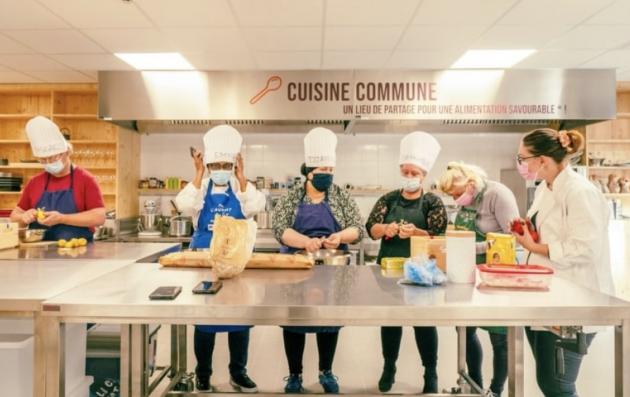 Municipality of LilleCopy linkFacebookXLinkedInEmail1 060 189
Municipality of LilleCopy linkFacebookXLinkedInEmail1 060 189Summary
At Fives, the closure of the metallurgic “Fives Cail Babcock” company in 2001 has been a tremendous shock for the population. Once carried up by the industrial fleuron, the neighbourhood has dramatically declined. With more than 20% unemployment rate (mostly long term); half of the population lives under the poverty level. Young people (half of population is under 30) can meet little job opportunity in the surroundings.
To reverse negative trends of urban poverty in the deprived neighbourhood of Fives and as part of a larger urban brownfield regeneration development, the project aims at (re)introducing productive activities centred on food. At the heart of the brownfield, a building of 2050 m2 has been renovated to host an innovative combination of activities in the fields of urban agriculture, production, culinary transformation and catering.
The project has been able to use food-related activities to seek and leverage against urban poverty. It has also developed prefiguration as a tool to testing a future Food Court in real-life.
Gentrification process is addressed from the start. Also, the existing population is the subject of special attention and is identified as the main target of the activities deployed. This project has integrated all the beneficiaries – and related partners – to co-create the most suitable building and activities for them all.
The innovative solution
The inhabitants of the FIVES neighbourhood are struggling with the following main issues: seclusion, lack of social interactivity, health problem, lack of training and job opportunities and loss of pride.
A central food hall has been created and mix cooking, productive and food-services activities: A “ Community kitchen” inviting neighbourhood inhabitants to join workshops and events; a professional kitchen hosting an Incubator to food projects and solidary caterer for skills development; a food Court to meet and gather around sustainable local meals and festivals; an urban farm combining training for agricultural job and pedagogy for citizens.
A collaborative and participative work
The project gathers 14 partners combining local authorities in charge of the future of the site (Ville de Lille) as well as in charge of social policies (CCAS), as well as the metropolitan area (Métropole Européenne de Lille) – together with researchers to support investigation in urban farming (ISA/Yncréa Hauts-de France) and in the evaluation (Maison Européenne des Sciences de l’Homme et de la Société), and stakeholders who are familiar with working with precarious publics («Les sens du Goût», Fédération du Nord du Secours Populaire Français, La Sauvegarde du Nord). Other partners supported the activities around jobs and skills (Maison de l’Emploi de Lille, Lomme, Hellemmes (MDE) and A table citoyens !/Baluchon) as well as media activities (Rencontres Audiovisuelles) and IT development activities (Le Centre d’Innovation des Technologies sans Contact). Finally, EPARECA/ANCT, a public /private company has been involvement for the purchase and management of the site.
The project was managed via a collective governance model involving all the partners. The design of the future Food hall was co-created with the local residents and participants to the activities.
The impact and results
The project was prototyped during 3 years at a temporary site, L’Avant-Goût de la cuisine commune, to allow residents and stakeholders to get to know the future project ; provide local NGOs and residents with facilities and material to cook, produce and process food; provide inhabitants with an open space for social activities several days a week, and, and develop a regulatory framework adapted to the objectives of the project. The learnings fed into the design for the future site, “Chaud Bouillon !”.
The results of the first 2 years of the project (from sept 2017 to June 2019), located at L’Avant-Goût, are: 15 000 users of the site; 23 events for the general public; 120 000 visitors during the summer; 500 cooking workshops; more than 100 partners involved.
Why this Good Practices should be transferred to other cities?
TAST’in FIVES has aimed to address an EU level priority, that is at the core of the Europe 2020 strategy and one of the 5 targets for 2020: 20 million less people at risk of poverty in 2020 compared to 2010. While it is clear today that this EU target will not be reached, cities are still working hard to combat poverty and social exclusion at local level. The solution proposed here combines a mix of relevant and complementary stakeholders in using food as a leverage against poverty in a dedicated building. Other cities, as well as job centres, or anti-poverty NGOs, might be interested in transferring part of or the entire project. The project is indeed quite adaptable as it is co-constructed with the knowledge of the NGOs on their beneficiaries and the beneficiaries themselves, together with a learning process and transformation for all.
Main ThemeIs a transfer practice0Emailcdagmey@mairie-lille.frRef nid15986 -
-
-

